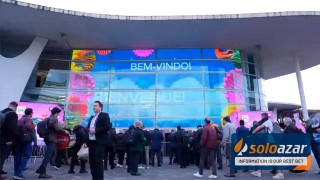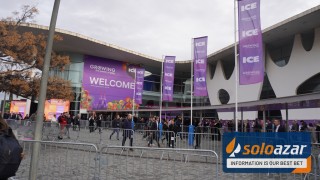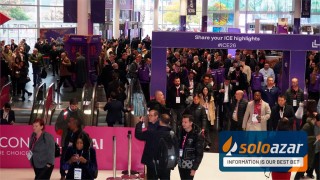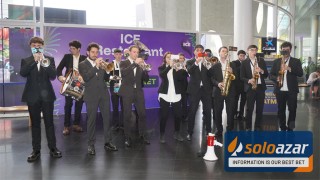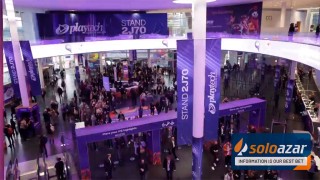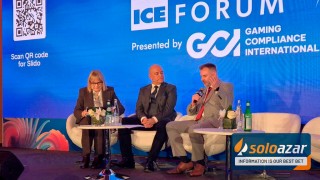Carlos Fonseca Sarmiento: "I believe Peru currently has the best gaming regulator in Latin America"
Wednesday 11 de June 2025 / 12:00
2 minutos de lectura
(Lima, SoloAzar Exclusive).- A few days before the new edition of Peru Gaming Show, Carlos Fonseca Sarmiento, who will participate in an Enforcement Conference on June 18th, the opening day of PGS, explains in detail the current situation of gambling regulation in Peru. He also compares it with the rest of Latin America and offers a critical view of the Peruvian government's actions regarding gambling taxes.
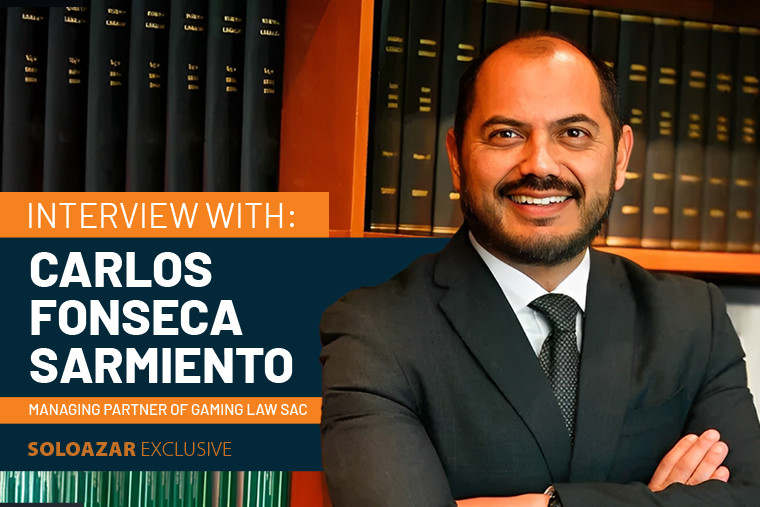
Carlos Fonseca Sarmiento is one of the most knowledgeable individuals on gaming regulation in Latin America. As a lawyer, arbitrator, and Master in Public Administration and Constitutional Law, he is undoubtedly an authoritative voice on the legal status of gaming in Latin America. He is also the Managing Partner of Gaming Law SAC and a Principal Member of the International Masters of Gaming Law (IMGL).
What are the main tax obligations of betting houses and casinos in Peru?
Like any company, it is subject to income tax. Additionally, it is subject to two special taxes. The tax on the operation of casino games or slot machines, which is actually equivalent to 11.76% of its gross profits, and a selective consumption tax, which is absolutely unconstitutional because it taxes a fixed amount for each gaming unit (slot machine or gaming table), regardless of whether the profit was greater than or equal to that fixed amount . More seriously, this tax must be paid even if the slot machine or gaming table did not generate profits or incurred losses. The Constitutional Court declared it unconstitutional, but only by 4 votes out of 7, and to expel it from the legal system, 5 votes were needed . However, the Congress of the Republic, through its Constitutional Commission, when it carried out political control of Legislative Decree 1419 (issued by the Executive Branch) that created this tax, also deemed it unconstitutional and approved a bill for its repeal. Unfortunately, this bill has been shelved and has never been discussed in Congress. This bill should be discussed again, as not all gambling in Peru is subject to such a tax burden.
Law No. 31557
What can you tell us about Law No. 31557, which regulates sports betting and remote gaming in the country?
The law was passed in the middle of the night, on July 15, 2022, at 2:13 a.m. Therefore, it was born with some "factory flaws," which made it necessary to modify it before it came into effect. Thus, Law 31806 was approved, published on June 28, 2023, and subsequently amended again by Legislative Decree 1416, published on September 13, 2024. Among the positive aspects of the regulation, we can mention that it is an open competition regime; those who meet the requirements obtain a gaming license. It allows operations from Peru or abroad. Gambling is permitted for both nationals and foreigners. It can be operated through websites but also in physical establishments, although in these, only sports betting is permitted. Finally, all types of remote games are accepted, but with regard to remote betting, only bets on sports competitions, e-sports, virtual sports, and finally, fantasy sports are permitted. Bets on non-sporting events, such as who will become Pope or President of a country, are not allowed.
Gambling legislation in Peru
How do you view the state of gaming regulation in Peru compared to other Latin American countries?
It's one of the best in the region. Although everything can be improved and there are still some gaps, the great advantage of Peruvian regulation compared to that of other countries is that there are "no surprises." Because of my job, I have to monitor all gambling laws in the region, and unfortunately, in some countries, reading the law isn't enough. I believe Peru currently has the best gambling regulator, even surpassing Brazil and Colombia, which also have detailed regulations. This is a great advantage because this sector is very dynamic and also dependent on technology. If regulators aren't trained, they can't make appropriate decisions. Furthermore, competition helps operators operate efficiently and offer high-quality, secure, and reliable products, benefiting users.
A few days ago, you were highly critical of the Peruvian state and published a text arguing that “it gives with one hand but take away with the other”. And I'm referring to the Peruvian Ministry of Economy and Finance, which promoted an anti-technical and unconstitutional ISC." Could you expand on this?
I've said this for the Ministry of Economy and the Executive Branch. This isn't the first time, and hopefully it's the last, that it makes mistakes in exercising its tax authority regarding gambling taxes. It doesn't make mistakes. It commits terrible things. Now it has established a Selective Consumption Tax on remote gaming and remote sports betting (Legislative Decree 1416), which only applies to players domiciled in Peru and to non-resident operators. This is absurd and constitutionally unsustainable, as it grossly violates the principle of equality in tax matters. Equal situations deserve equal treatment. Under Peruvian law, any person of legal age, domiciled in Peru or abroad, can gamble on any website authorized by MINCETUR. But experts at the Ministry of Economy have come up with the idea that the Selective Consumption Tax doesn't have to be paid by players who don't have habitual residence in Peru, or by those who do have habitual residence in Peru but play on the platforms of established operators. On the other hand, if this is a tax on players, why would they tax them when they bet with bonuses if they don't come out of their own pockets? Where is the taxable income in that case? And the icing on the cake is the Supreme Decree regulating Legislative Decree 1416. Clumsily, they try to correct their error by pointing out that established operators are also taxpayers, forgetting an elementary principle of tax law: the Reserve of Law. This means that taxes are only created, modified, or repealed by legal provisions. Never by Supreme Decree. And all this nonsense is done with our tax dollars. The complete opposite of what MINCETUR does, which seeks rational regulations. The Ministry of Economy's ignorance and recklessness generate unnecessary costs and force it to go to court.
The Conference in Peru Gaming Show
Finally, what can you tell us about your participation in the Enforcement conference at the Peru Gaming Show?
Based on my experience in this sector—30 years as a lawyer specializing in gambling—I would like to offer some recommendations on what the State should do to combat the black market. Good legislation or an authority knowledgeable in the technical field is useless if there are no effective measures to eliminate illegal gambling, which only brings negative externalities. There are four key players in the successful fight against the black market: i) legislators, ii) the gambling regulator, iii) operators, and iv) service providers to operators. We could now add one more: social media. Without a coherent plan and sufficient political support, what we see in many jurisdictions will happen: the proliferation of illegal gambling on the one hand and harsh demands on legal gambling. Absolute inconsistency.
Relive PERU GAMING SHOW 2025 experience with SoloAzar's social media coverage and exclusive interviews.
Follow us on LinkedIn and Instagram to stay in the loop!
Categoría:Events
Tags: PGS, Peru Gaming Show,
País: Peru
Región: South America
Event
ICE Barcelona 2026
19 de January 2026
Daniel De Los Ríos on Amusnet’s ICE Barcelona 2026 Experience and LATAM Growth Plans
(Barcelona, SoloAzar Exclusive).- The Head of Commercial and Marketing in LATAM at Amusnet shares insights on the company’s latest innovations, industry trends, and strategic goals for 2026.
Thursday 05 Feb 2026 / 12:00
Tomás Galarza: "This edition of ICE was especially relevant for ASAP"
(Barcelona, SoloAzar Exclusive). Following his participation in ICE Barcelona 2026, Tomás Galarza, a Political Science graduate and foreign trade expert at ASAP, shares his insights on global trends, international business opportunities, and the company's strategic priorities for this year.
Wednesday 04 Feb 2026 / 12:00
Win Systems Expands Presence in Spain and Highlights Route Operations at ICE 2026
(Barcelona).- At ICE 2026 in Barcelona, Win Systems showcased its innovative gaming solutions for the Spanish market, emphasizing Player Tracking, Win Pay, and route operations to enhance operator performance and player engagement.
Wednesday 04 Feb 2026 / 12:00
SUSCRIBIRSE
Para suscribirse a nuestro newsletter, complete sus datos
Reciba todo el contenido más reciente en su correo electrónico varias veces al mes.










